
Acta Brasiliensis
Scope & Guideline
Sharing Insights and Innovations in Brazilian Research
Introduction
Aims and Scopes
- Biodiversity Studies:
Research on the diversity of species, including flora, fauna, and microorganisms, often focusing on endemic species and their ecological interactions. - Ecological Research:
Investigations into ecological dynamics, habitat interactions, and the impact of anthropogenic changes on ecosystems, particularly in Brazilian biomes. - Conservation Biology:
Studies aimed at understanding conservation strategies, species at risk, and the effects of climate change and habitat destruction on biodiversity. - Pharmacological and Biochemical Analyses:
Research exploring the biochemical properties of plants and animals, including studies on medicinal properties and the potential for pharmaceutical applications. - Environmental Impact Assessments:
Evaluations of the ecological ramifications of human activities, particularly in urban and agricultural contexts, aiming to inform sustainable practices. - Invasive Species Research:
Studies focused on the introduction and impact of non-native species in Brazilian ecosystems, assessing their ecological consequences and management strategies. - Microbial Ecology:
Research on microbial communities in various environments, exploring their roles in nutrient cycling, biodegradation, and ecosystem functioning.
Trending and Emerging
- Antioxidant and Pharmacological Evaluations:
There is an increasing focus on the antioxidant properties of natural compounds and their potential health benefits, indicative of a growing interest in phytochemistry and natural products. - Climate Change Impacts on Biodiversity:
Research examining the effects of climate change on species distribution and ecosystem dynamics is on the rise, emphasizing the urgency of addressing environmental change. - Microbial Biodegradation and Environmental Remediation:
Publications exploring the use of microbes for bioremediation and waste management are gaining momentum, reflecting an increasing interest in sustainable environmental practices. - Invasive Species Management:
Emerging studies on the management and ecological impact of invasive species indicate a growing recognition of their threats to local biodiversity. - Ecological Niche Modeling:
The application of ecological niche modeling techniques to understand species distributions and habitat suitability is becoming more prevalent, showcasing advancements in ecological research methodologies.
Declining or Waning
- Urban Ecology:
Research in urban ecology has seen a decrease, potentially due to a shift towards more pressing environmental issues related to biodiversity and conservation in natural habitats. - Traditional Agricultural Practices:
Studies focused on traditional agricultural methods have waned, possibly as attention shifts towards sustainable and modern agricultural practices that prioritize environmental impacts. - Historical Biogeography:
Investigations into historical patterns of species distribution are less frequently published, suggesting a potential transition towards more contemporary ecological and conservation studies. - Chemical Ecology of Insects:
Research specifically addressing the chemical interactions of insect species has declined, perhaps reflecting a broader focus on ecological interactions and conservation. - Mycology Studies:
While still relevant, research specifically focused on fungal species and their ecological roles appears to be receiving less attention compared to other biological areas.
Similar Journals
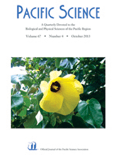
PACIFIC SCIENCE
Bridging Disciplines for a Deeper Understanding of the PacificPACIFIC SCIENCE is a prestigious multidisciplinary journal published by University of Hawaii Press, dedicated to advancing knowledge across diverse fields of study related to the Pacific region. With a robust ISSN of 0030-8870 and an E-ISSN of 1534-6188, this journal serves as a vital platform for researchers, professionals, and students to disseminate and access influential research findings that contribute to the understanding of ecological, cultural, and social dynamics in the Pacific. The journal has steadily maintained its relevance since its inception in 1947 and features a commendable Scopus Rank of #74 out of 171 in the multidisciplinarity category, placing it in the 57th percentile of its field, and is recognized as having a Q2 quartile ranking in 2023. Although lacking open access options, PACIFIC SCIENCE offers in-depth analysis and scholarly discourse, effectively bridging various disciplines to foster collaboration and innovation. With its commitment to high-quality research and its significant impact on Pacific studies, the journal continues to play an important role in informing policy, conservation efforts, and community engagement within this vital region.
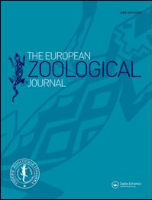
European Zoological Journal
Elevating the Study of Animal Sciences Across EuropeEuropean Zoological Journal, published by Taylor & Francis Ltd, is an esteemed open-access publication dedicated to advancing the exciting field of zoology. Since its inception in 2017, this journal has progressively established itself as a vital resource for researchers, professionals, and students alike. With its Q2 ranking in Animal Science and Zoology as of 2023, the journal ranks in the 69th percentile among its peers, showcasing its influence and contribution to the discipline. The journal’s broad scope covers a wide range of topics within zoology, aiming to foster an understanding of animal biology and conservation efforts. As an open-access journal, it not only enhances the dissemination of knowledge but also encourages collaborative research across global communities. Situated in the United Kingdom, the European Zoological Journal invites submissions that contribute to the evolving discourse in animal sciences, and endeavors to support the scientific community in addressing pressing ecological challenges.
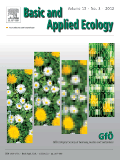
BASIC AND APPLIED ECOLOGY
Elevating the discourse in ecology, evolution, and behavior.BASIC AND APPLIED ECOLOGY, published by Elsevier GmbH in Germany, stands out as a premier journal in the field of ecology, evolution, behavior, and systematics. With its ISSN 1439-1791 and E-ISSN 1618-0089, the journal enjoys a distinguished reputation, evidenced by its classification in the Q1 category for Ecology in 2023 and impressively ranking #89 out of 721 in this domain according to Scopus. Since its inception in 2000, it has served as a vital platform for disseminating high-quality research that bridges theoretical insights and practical applications in ecology. Researchers, professionals, and students alike can look forward to the latest findings that not only foster a deeper understanding of ecological processes but also inform sustainable practices crucial for our environment. As the journal continues its journey through to 2024, it remains committed to advancing ecological knowledge and supporting innovative research in an ever-evolving field.
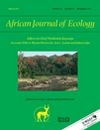
AFRICAN JOURNAL OF ECOLOGY
Unveiling the Secrets of African EcosystemsThe African Journal of Ecology, published by Wiley, is a leading academic journal in the field of Ecology, Evolution, Behavior, and Systematics. Established in 1963 and continuing its vital contributions to the field until 2024, this journal serves as a premier platform for researchers and scholars to share groundbreaking studies that explore the intricate relationships within ecosystems, particularly in the African context. With an impressive Scopus Rank of #423 out of 721 and a Q3 Quartile ranking, it stands as a credible source of scholarly information, gaining recognition among peers for its rigorous peer-review process and impactful publications. While the journal is not open access, it remains influential in driving advancements in ecological research and providing insights vital for conservation efforts and biodiversity studies. Authors and readers alike will find that the African Journal of Ecology not only promotes scientific inquiry but also fosters a deeper understanding of ecological dynamics that affect our world.

JOURNAL OF CAVE AND KARST STUDIES
Discovering the Secrets of Subterranean WorldsJOURNAL OF CAVE AND KARST STUDIES, published by the NATIONAL SPELEOLOGICAL SOCIETY, stands as a leading academic platform dedicated to advancing knowledge in the field of cave and karst studies. Since its inception in 1996, this journal has consistently provided high-quality research articles that explore the geological, biological, and hydrological processes associated with these unique environments. With an impact factor that situates it in the Q3 category of Earth-Surface Processes, indexed by Scopus, it ranks 97th out of 179 journals in this domain, reflecting its contribution to the field. Although open access is not currently offered, the journal's rigorous peer-review process ensures scholarly integrity and quality. Researchers, professionals, and students around the globe are encouraged to engage with the journal for the latest insights and breakthroughs, fostering a greater understanding of cave and karst ecosystems. For more information, please refer to their address in Huntsville, AL, or visit their official website for submissions and guidelines.

NACC-Nova Acta Cientifica Compostelana Bioloxia
Elevating Biological Research with Every Publication.NACC-Nova Acta Cientifica Compostelana Bioloxia is a pivotal academic journal published by the University of Santiago de Compostela, dedicated to advancing knowledge in the field of biological sciences. With an ISSN of 1130-9717 and an E-ISSN of 2340-0021, this journal serves as a vital platform for researchers and professionals to disseminate their findings and collaborate on key issues within the discipline. Although it currently does not offer an open access model, its relevance is underscored by its commitment to high-quality scientific rigor, making it an essential resource for students, academics, and practitioners alike. The journal aims to promote innovative research and foster the exchange of ideas in biological studies, contributing significantly to the academic community's understanding of a diverse range of biological phenomena. Its headquarters are located at the Servicio de Publicaciones e Intercambio Cientifico, Campus Univ Sur, Santiago de Compostela 15782, Spain, emphasizing its strong European roots and commitment to empowering researchers.
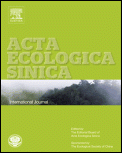
Acta Ecologica Sinica
Pioneering research at the intersection of ecology and sustainability.Acta Ecologica Sinica, published by Elsevier, is a prominent journal in the field of ecology, with a strong focus on fostering understanding in ecological principles and their applications. Established in China, this journal holds an impressive Q2 categorization in both Ecology and Ecology, Evolution, Behavior and Systematics as of 2023, positioning it within the top tier of ecological research. With its Scopus rankings placing it in the 81st and 78th percentiles in relevant ecological domains, it serves as a vital platform for researchers and practitioners to disseminate findings that promote ecological sustainability. Although it operates under a traditional access model, its significant impact is underscored by its systematic convergence of key ecological inquiries across multiple years (2006-2008, 2014, 2017-2023). By engaging with the latest empirical studies, theoretical advancements, and methodological innovations, Acta Ecologica Sinica is indispensable for scholars dedicated to advancing ecological knowledge and addressing environmental challenges.
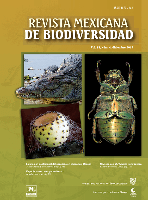
Revista Mexicana de Biodiversidad
Advancing the Science of Biodiversity in Mexico and BeyondRevista Mexicana de Biodiversidad is a prominent academic journal dedicated to the field of biodiversity and conservation, published by the prestigious Instituto de Biología, Universidad Nacional Autónoma de México. Since its inception as an Open Access publication in 2005, it has aimed to disseminate high-quality research that advances the understanding of biological diversity in Mexico and beyond. With an ISSN of 1870-3453 and an E-ISSN of 2007-8706, the journal caters to a diverse audience, including researchers, professionals, and students, by providing vital insights into ecological studies, conservation strategies, and the sustainable management of natural resources. The journal is committed to fostering scientific collaboration and promoting the significance of biodiversity in addressing contemporary environmental challenges. By publishing innovative and impactful research, the Revista Mexicana de Biodiversidad plays an essential role in the global discourse on biodiversity conservation.

Ecological Solutions and Evidence
Advancing ecological understanding through empirical evidence.Ecological Solutions and Evidence, published by WILEY, stands as a leading platform in the field of ecology, environmental science, and sustainability, with a commendable reputation starting from its inception in 2020. Operating under rigorous academic standards, this journal has achieved notable distinctions by securing a Q1 category ranking in Ecology, Management, Monitoring, Policy and Law, and Nature and Landscape Conservation, making it an invaluable resource for researchers seeking to address pressing environmental challenges. With a current impact factor reflective of its influential articles, the journal features an international scope, focusing on innovative solutions derived from empirical evidence. Accessible to a global audience, the journal encourages open discourse in the field, further supporting researchers, professionals, and students striving to foster ecological sustainability and informed policy-making. Published in the United Kingdom, it aims to bridge the gap between science and application in real-world contexts, promoting actionable insights and interdisciplinary collaboration.
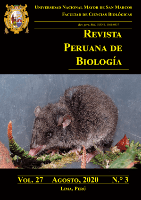
REVISTA PERUANA DE BIOLOGIA
Fostering Global Knowledge in Biological SciencesREVISTA PERUANA DE BIOLOGIA, an esteemed journal published by the Universidad Nacional Mayor de San Marcos, Faculty of Biological Sciences, has been a vital platform for disseminating significant biological research since its inception in 1974. With an Open Access model, this journal ensures that high-quality research is freely available to readers across the globe, fostering the advancement of knowledge within the field of agricultural and biological sciences. Despite proprietary challenges, the journal has secured a respectable Q3 category ranking in Agricultural and Biological Sciences and currently holds a 137th rank in Scopus among its peers. By embracing a comprehensive scope, REVISTA PERUANA DE BIOLOGIA encourages submissions that contribute to diverse biological topics, making it an essential resource for researchers, professionals, and students looking to enhance their understanding and expertise. With its ongoing commitment to excellence, this journal remains a cornerstone of biological research in Peru and beyond, reinforcing the importance of collaboration and knowledge sharing in the scientific community.